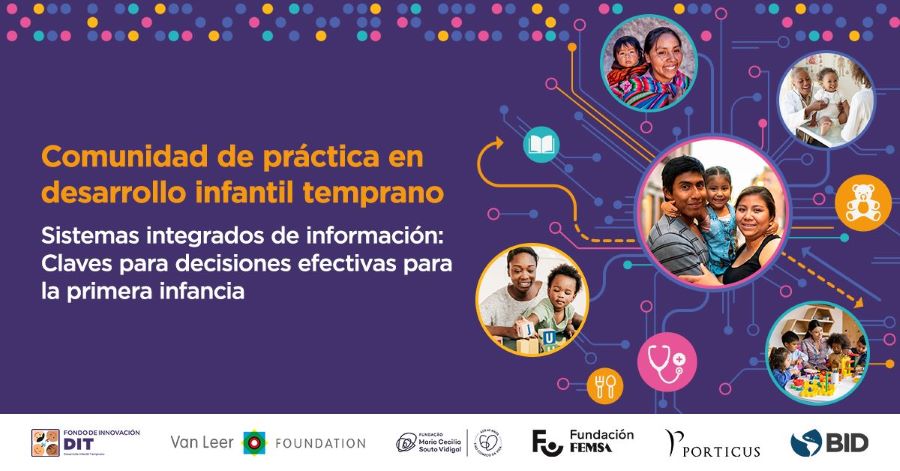An information system is much more than technology; it is the key to making every child visible, ensuring equitable access to services, and optimizing available resources. In early childhood, a critical period that lays the foundation for life, integrated information systems are powerful tools to transform lives.
This was the main conclusion of the 6th edition at the Community of Practice on Early Childhood Development, co-organized by the IDB and the Fundação Maria Cecilia Souto Vidigal in August. The event gathered more than 100 participants from 22 countries, experts and policymakers from across the region and beyond, who shared experiences and insights on advancing early childhood development through better data.

Why are integrated information systems so crucial?
Latin America and the Caribbean faces persistent challenges in early childhood policies that integrated information systems can help address:
1. Closing access gaps: Before the pandemic, the region’s enrollment in early childhood care centers for children aged 0–2 was already low, reaching only 15% of children. Attendance among children aged 3–5 reached 68%, compared to 92% in OECD countries. The pandemic further disrupted early childhood services, deepening existing inequalities. Without data to identify who the children are, where they live, and what services they receive, it is impossible to close these gaps.
2. Tracking development and service quality: By monitoring in real time both children’s developmental milestones and the services they receive, information systems help target support where it is most needed. This is especially vital in a region where five-year-old children from vulnerable households may experience up to a 1.5-year lag in vocabulary compared to their peers from more advantaged environments.
These systems form the backbone of effective public policy, enabling evidence-based decision-making, ensuring service quality, fostering intersectoral coordination (health, education, social protection), promoting accountability, and building an integrated safety net for children and families.
The anatomy of a successful system: what makes the difference
An information system must embody certain characteristics to be truly useful. Participants at the event highlighted these key attributes:

- Sustainability: Long-term viability with reasonable maintenance costs and efforts.
- Reusability: Maximizing the use of existing components, data, and processes to avoid duplication.
- Interoperability: Seamless integration with other platforms and databases to enable timely, reliable decision-making.
- Scalability: Capacity to expand without losing performance.
- Flexibility: Ability to adapt to new needs, technologies, and contexts, supported by modular architecture that allows components to be easily added, modified, or replaced.
- Collaboration: Engagement of both internal and external stakeholders in management and updates to ensure relevance and ownership.
Designing such systems also requires attention to technical aspects, including: (i) standardizing data to ensure consistency; (ii) implementing mechanisms to safeguard the confidentiality of sensitive information; and (iii) creating integrated data repositories to facilitate access for policymakers.
Country experiences: lessons from Brazil, Chile, and El Salvador
Brazil: Governance and long-term vision. Brazil is building a comprehensive data ecosystem that connects information across sectors. A multi-ministerial governance committee ensures legitimacy and coordination. In parallel, digital tools such as mobile apps and personalized notifications are empowering families. These efforts are framed within the country’s legal framework for early childhood.
Chile: A consolidated system with a legal foundation. Through Chile Crece Contigo, the country has institutionalized a nominal child-tracking system that links the health and early childhood sectors. A solid legal framework governs data exchange and protection, ensuring interoperability and long-term sustainability.
El Salvador: A unique identifier for integrated follow-up. El Salvador assigns each child a unique identification number at birth, serving as the anchor for connecting data across sectors. The main challenge now lies in promoting a cultural shift so that the system is embraced as a useful tool rather than a bureaucratic requirement.
Conclusions: The path toward data integration
The event underscored the value of peer learning and knowledge exchange across countries in the region. Despite differences in size and context, from Brazil’s 18 million children to El Salvador’s 600,000, countries share common challenges and opportunities in advancing early childhood development.
- Different stages, common challenges. Although early childhood policies have evolved at different paces (Chile since 2007; Brazil and El Salvador more recently), all face the dual task of expanding coverage and improving service quality. This underscores the regional importance of strengthening information systems.
- Utility and change management. For these systems to be adopted and used effectively, their utility must be clear to everyone involved, from government officials to frontline workers. When users fail to see their value, the likelihood of generating quality data that informs public policy diminishes.
- Intersectoral and holistic perspective. The greatest opportunity lies in integrating data and policies across sectors. By considering the child’s health, education, and social environment, countries can design more effective programs, deliver coordinated responses, and avoid duplication of efforts while optimizing local and national capacities.
- What gets measured gets prioritized. Besides tracking progress, these systems promote transparency and citizen engagement. They provide the information needed to adjust program implementation in the short, medium, and long term, ensuring that resources are directed to where they are most needed.
Building stronger systems for every child
Strengthening early childhood policies requires both technology and collaboration. Integrating data and aligning efforts builds the foundation for ensuring that every child, regardless of origin, receives the comprehensive care needed to reach their full potential.
If you’d like to join the Community of Practice, you can fill out the form by clicking here.
The Community of Practice on Early Childhood Development is an initiative of the Early Childhood Development Innovation Fund (DIT), a partnership between the Inter-American Development Bank (IDB), Fundación FEMSA, Fundação Maria Cecilia Souto Vidigal, Porticus, and the Van Leer Foundation, which finances, designs, implements, and evaluates innovative, scalable solutions to improve the lives of young children across Latin America and the Caribbean.


Leave a Reply